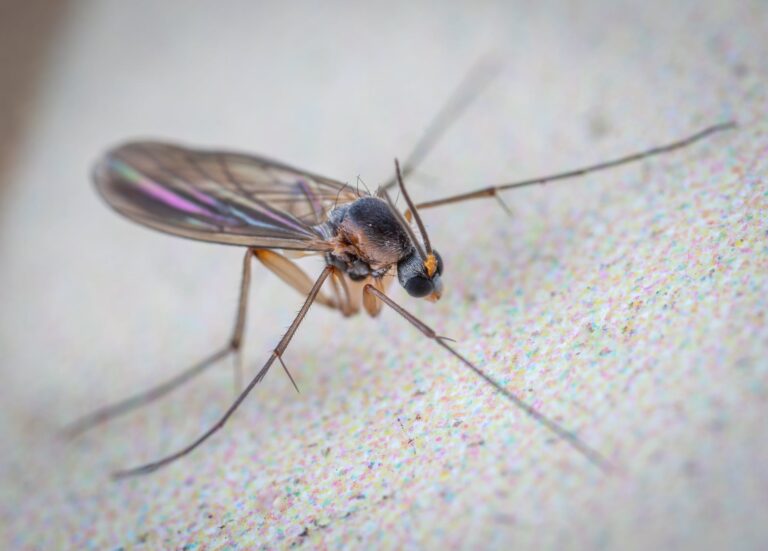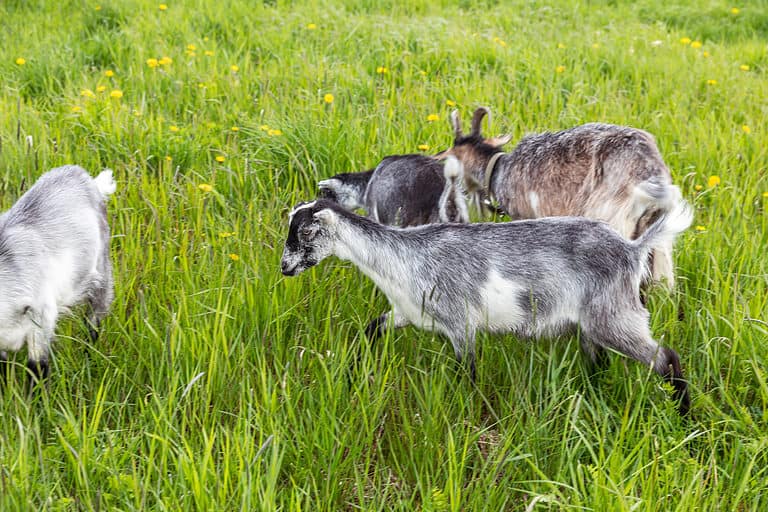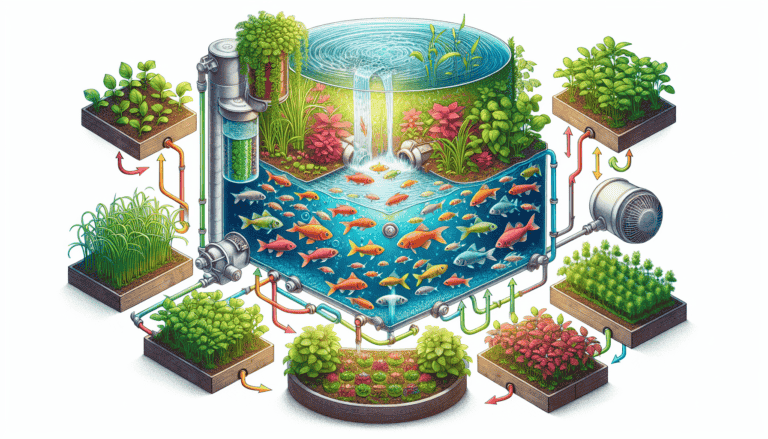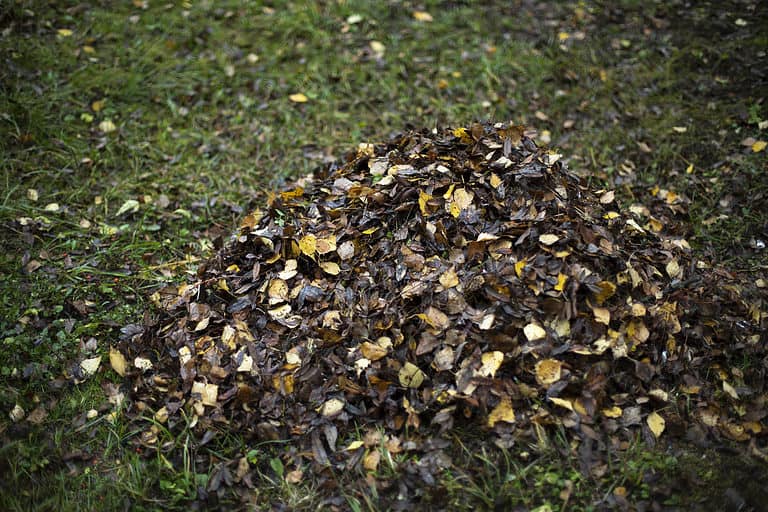How to Start a Honey Business: A Practical Guide
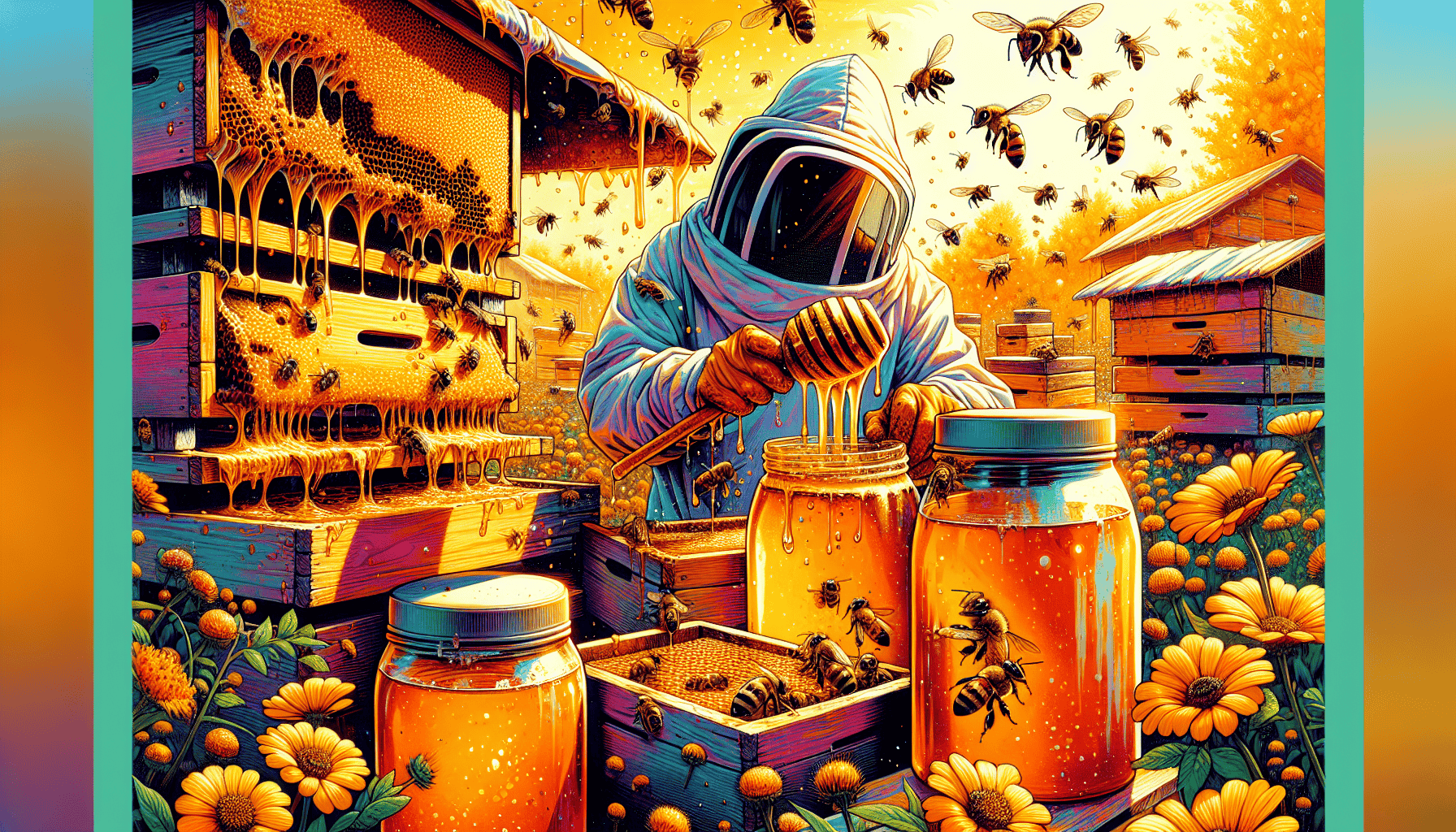
Are you ready to start your own honey business? This guide will walk you through the essential steps, from understanding beekeeping basics to setting up your hive and managing legal requirements. Learn how to start a honey business successfully with detailed advice on location, acquiring bees, and marketing your honey products.
Key Takeaways
Starting a honey business requires understanding beekeeping basics, creating a detailed business plan, and complying with local regulations.
Market research is essential to identify demand and competition, helping you define your products and develop effective marketing strategies.
Building a support network through local associations and learning from experienced beekeepers is crucial for success and continuous improvement in your honey business.
How to Start a Honey Business: A Practical Guide
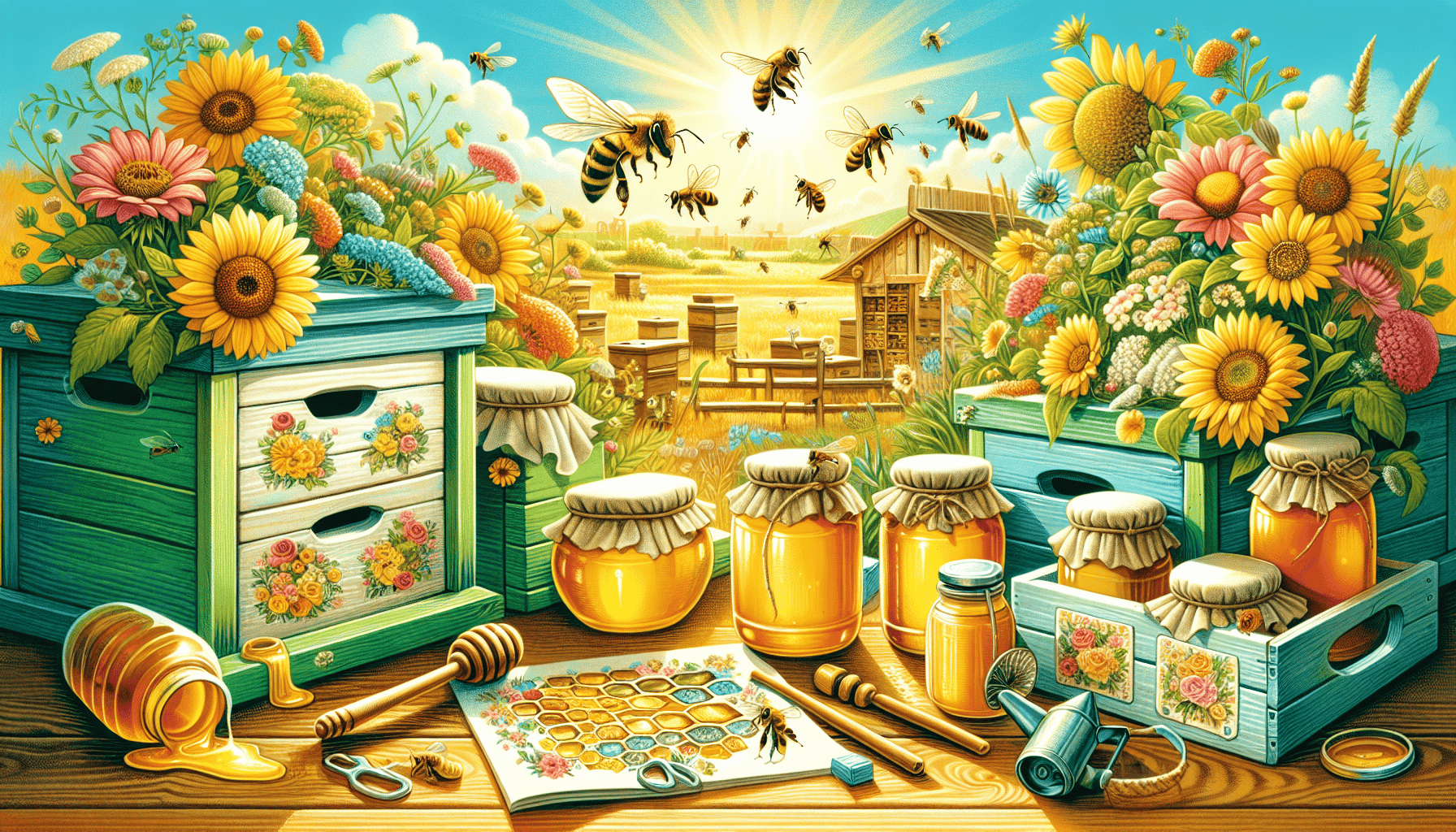
Starting a honey business is an appealing venture for those who love nature and sustainability. It doesn’t require formal education or significant investment, but does necessitate a commitment to learning and preparation. While it may not be difficult to start, it requires time and effort in planning and organization.
The key steps to starting a beekeeping business include understanding the basics of beekeeping, choosing a suitable location, acquiring honey bees, and setting up bee hives. Additionally, focusing on logistics and legal aspects after creating a plan is crucial for a smooth operation.
Avoiding common pitfalls and staying informed about best practices will help ensure the success and sustainability of your bee farm business.
Introduction
Bee farming is not only a profitable business, but also an essential practice for maintaining the health of our ecosystems. A bee farmer plays a crucial role as pollinators, ensuring the production of 85% of crops consumed by humans. However, bees are dying at alarming rates, posing significant challenges to ecosystems and agriculture.
Understanding the importance and challenges of beekeeping is essential for both ecological and economic reasons. Starting a honey business contributes to preserving bee populations and meets the rising global demand for bee products. This dual impact makes beekeeping a meaningful and rewarding endeavor.
Understanding the Basics of Beekeeping
Initiating a beekeeping business begins with grasping the fundamental concepts of managing bees. This entails acquiring knowledge on honey bee characteristics, their significance in nature, and mastering the skills needed to handle bee colonies along with obtaining appropriate gear for keeping bees.
Strategizing is vital when you’re setting up your own enterprise focused on raising bees. You must pick an optimal place for establishing your bee farm, procure the necessary number of honey-producing insects and install hives properly. It’s equally crucial to learn from others who keep bees so as not to fall into common traps that may arise.
Grasping how pivotal honeybees are in pollination processes and their contributions to agriculture can inspire you to embark on creating a business centered around apiary activities. Cultivating beehives doesn’t just benefit ecological systems, but also promises financial returns from sales of produced honey.
Developing a Honey Business Plan
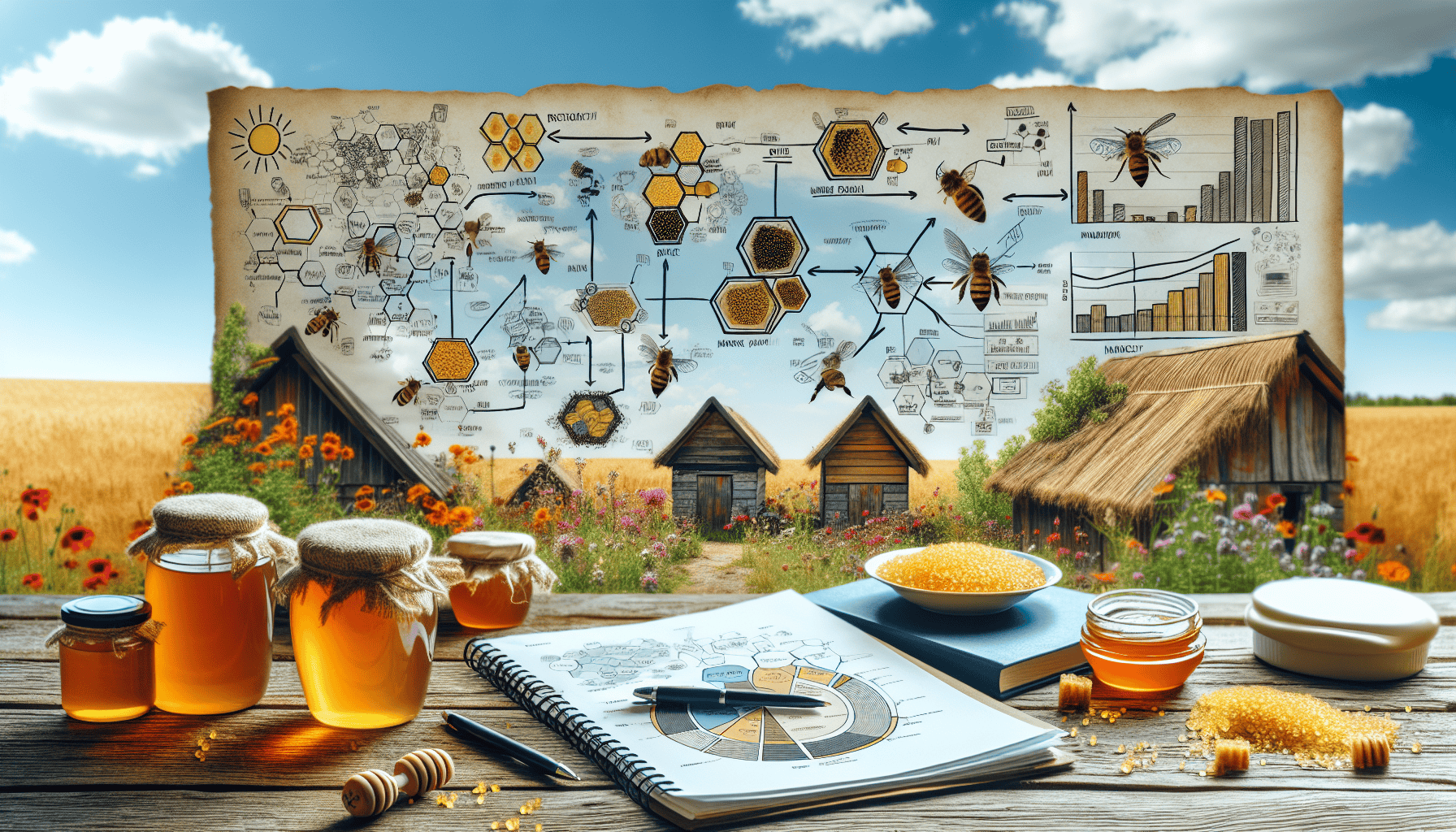
Starting a honey bee farm requires the careful development of a business plan, which is fundamental in delineating your objectives, approaches, and operational details. This step significantly improves the likelihood of prospering in the honey business.
Ensuring that your beekeeping business covers all necessary facets—from conducting thorough market research to meticulous budgeting and securing finances—is made possible through crafting an organized and comprehensive business plan.
Conduct Market Research
It is crucial to undertake market research to ascertain the existence of demand for your offerings and evaluate the competitive landscape in the honey industry. Pinpointing a unique segment within the market where your honey business can flourish is fundamental for financial success.
Comprehensive market research should inform your approach, regardless if your sales targets are end consumers or businesses. This step will steer the direction of your strategy in establishing yourself within this sector.
Define Your Products and Services
Operating a bee farm allows for the creation and distribution of an array of items such as fresh honey, beeswax, royal jelly, propolis, and pollen. By expanding your range to include products like candles made from beeswax or gourmet foods enhanced with honey, you can appeal to various consumer groups and boost potential income.
Offering pollination services presents another avenue for generating profit within your honey enterprise.
Budgeting and Funding
Managing your finances effectively is a fundamental part of formulating a plan for your honey business. Acquiring a colony of honey bees may start at around £75, with Investments required in the upkeep of beehives such as purchasing sugar syrup, pollen patties, and mite treatments. For two hives, you can expect to spend about $300 each year on maintenance.
It’s vital to segregate your business funds from personal accounts in order to administer the financial aspects of your beekeeping venture efficiently.
Acquiring Beekeeping Knowledge and Skills
Acquiring expertise in beekeeping is crucial for launching a thriving honey business. Utilizing educational resources, such as British Beekeepers Association courses and literature, participating in workshops, and networking with other beekeepers, can offer significant understanding and practical experience.
Having a thorough comprehension of bees along with the intricacies of beekeeping will furnish you with the necessary know-how to proficiently operate your honey bee farm.
Join Local Beekeeping Associations
Engaging with local beekeeping groups presents a wealth of advantages, including the opportunity to tap into crucial area-specific understanding and support that caters uniquely to the regional environment. Involvement in these organizations opens doors for connecting with seasoned beekeepers as well as offering access to resources like introductory ‘taster days’, which allow novices an authentic glimpse into hive examinations.
For those starting out in apiculture, this community-based network is vital not only for establishing their reputation but also for acquiring valuable insights from knowledgeable individuals.
Learn from Experienced Beekeepers
Acquiring practical knowledge and expertise from seasoned beekeepers is essential for the success of a honey business. Mentorship programs available through local beekeeping clubs provide invaluable opportunities to link novice beekeepers with experts in the field.
Participation in both online communities and local beekeeper groups is crucial as it provides ongoing education and support, which are key elements for advancing your venture into honey production.
Setting Up Your Honey Bee Farm
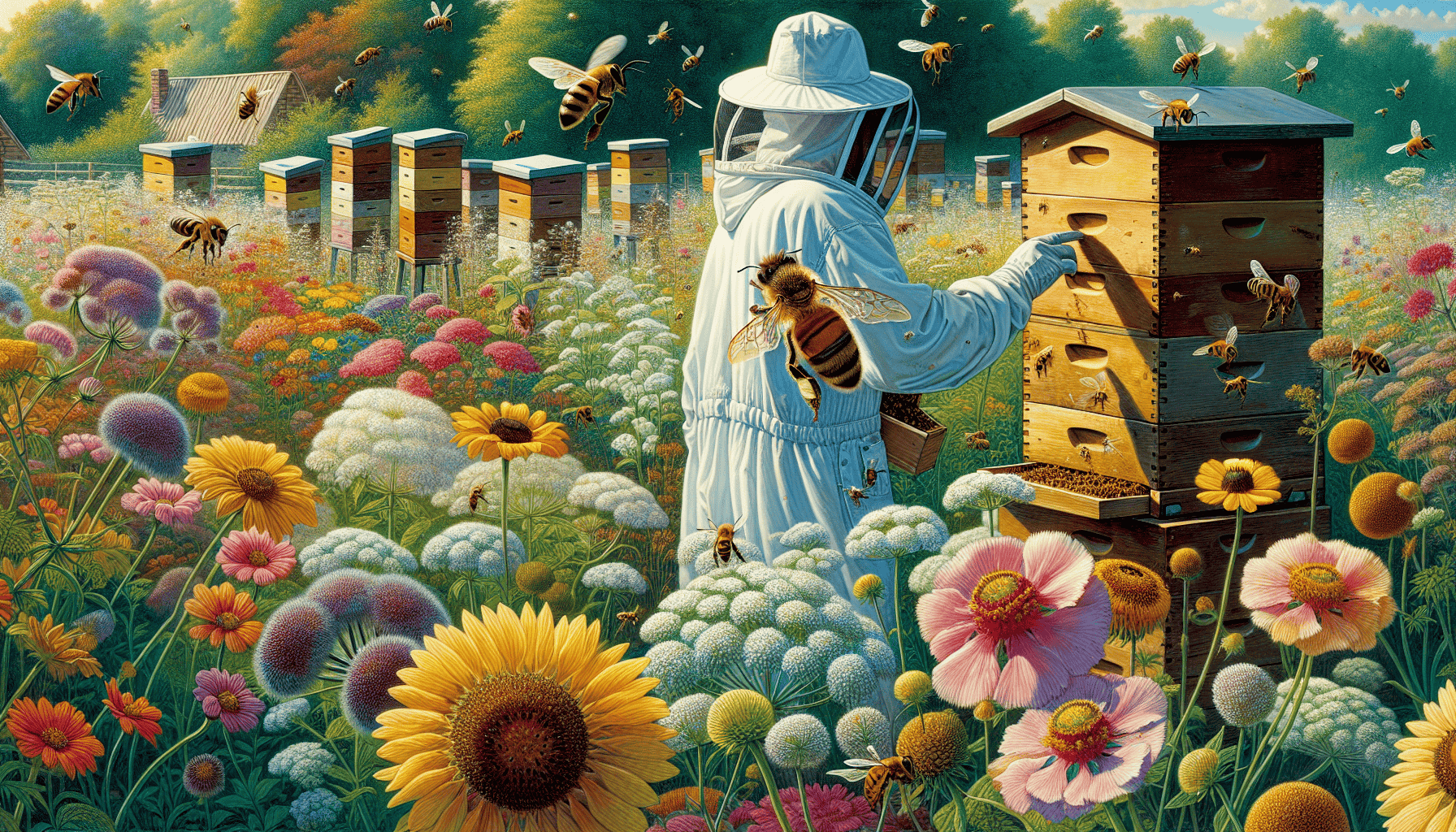
Establishing a honey bee farm requires you to undertake critical measures, such as selecting an appropriate site, procuring the bees themselves, and installing bee hives. It’s equally important that your bee farming practices adhere strictly to area-specific agricultural regulations.
Commencing with raised hives is beneficial for safeguarding against dampness and preventing animals from reaching them, which in turn supports a thriving beekeeping operation.
Choose a Suitable Location
When selecting a site for your honey bee farm, it’s important to take into account the climate, availability of food sources for the bees, and any local regulations that might be in place. Optimal environments for bees include those with plenty of sunlight, access to fresh water, protection from winds, and seclusion from areas with heavy traffic.
Urban settings can also accommodate a honey bee farm. You could effectively manage at least one hive on rooftops or within backyards. To reduce encounters between bees and humans, aim to position hives at least 50 feet away from areas that are frequently busy.
Acquire Honey Bees
You can obtain honey bees by buying packages, nucs, or by enticing swarms to settle in your hive. It is usually advised to reserve packaged bees early to ensure you get them.
A nucleus colony includes a few frames along with a queen bee and it accelerates the commencement of honey production. Alternatively, drawing in a swarm offers an option for procuring honey bees without spending money on them.
Set Up Bee Hives and Equipment
To commence beekeeping, the most crucial piece of equipment required is a bee hive. For the initial year, you can anticipate an approximate expenditure of $750 for setting up a bee hive. It’s important to select long-lasting and cost-effective beekeeping equipment that aligns with your financial plan.
The longevity and success of your beekeeping business hinge on investing in robust gear designed for enduring use.
Caring for Your Honey Bees
To maintain the vitality and efficiency of your honey bee hives, consistent upkeep and observation are essential. It’s vital to be knowledgeable about the various illnesses and pests that pose a threat to honey bees while also applying efficient control methods.
Ensuring that bee colonies remain in good condition entails carrying out routine checks on their homes as well as thorough cleaning. To achieve this goal, you should plan for an annual time investment between 15 and 30 hours.
Hive Maintenance
Consistent examination of hives is essential to maintain bee colony health. Beekeepers need to be vigilant for indications of illness during these checks, which include unusual behavior in bees and any visible afflictions. Keeping the hive surroundings clean is a key factor in thwarting disease and fostering the prosperity of the entire colony.
Undertaking habitual upkeep duties aids in cultivating bee colonies that are both more robust and prolific.
Pest and Disease Management
Creating a comprehensive Integrated Pest Management (IPM) strategy is crucial for beekeepers to ensure sustainable hive health monitoring and pest control. It’s vital to consistently check bee colonies for invaders like Varroa mites to keep hives healthy.
Implementing successful management of pests and diseases is key to securing the long-term viability and efficiency of your beekeeping business, which centers around careful bee management.
Seasonal Beekeeping Tasks
In beekeeping, a range of seasonal duties is critical for success, such as controlling swarm behavior in springtime, guaranteeing adequate nutrition and safeguarding hives against adverse weather conditions during periods of dormancy. From mid-summer through early autumn, it’s important to prepare for honey collection. It’s also vital that research on various harvesting methods be carried out and preparations made in anticipation of the changing seasons.
Harvesting and Packaging Honey

The extraction, purification, and packaging of honey represent fulfilling aspects of apiculture. It is essential to employ correct methods throughout these stages for the preservation of honey quality and the safeguarding of the bee colonies’ well-being.
If your current setup does not suffice, it might be prudent to consider subcontracting production activities as required.
Honey Harvesting Methods
Typically, honey may be collected 2-3 times annually, influenced by the vigor of your bee colonies and the surrounding environmental conditions. Techniques for harvesting honey encompass utilizing a bee brush to gently clear bees from frames as well as employing an uncapping knife for reaching the honey.
It is vital to extract raw honey with care and minimal disruption to ensure that hives remain healthy which in turn facilitates continuous production of honey by the bees.
Processing and Filtering Honey
To guarantee the quality and purity of honey, it is crucial to process and filter it effectively. By employing techniques that rely on pressure or gravity, impurities and particles of wax can be eliminated. Following extraction, honey ought to pass through cloth filters as well as metal mesh in order to thoroughly clear out any debris.
Such meticulous filtration certifies that the resulting honey adheres strictly to elevated benchmarks for both freshness and purity.
Packaging and Labeling Honey
It is essential to ensure that honey is packaged and labeled in adherence to regulatory requirements and for the protection of consumers. The packaging process for honey must meet the standards set out for food safety, which includes keeping it free from contaminants by maintaining a clean environment.
Labels affixed to honey products need to clearly display certain information: this includes the product’s standard name, its net weight presented in both customary (imperial) units as well as metric measurements, along with contact information for the producer responsible for manufacturing.
Marketing and Selling Your Honey Products
For your honey business to thrive, it is imperative to deploy successful marketing and sales tactics. These should encompass the development of a robust brand presence, utilization of digital marketing avenues, and tapping into local market opportunities. Undertaking thorough market research plays an invaluable role by providing insights into what consumers seek and informing your strategy.
The power of compelling narratives along with visually appealing packaging can greatly improve consumer appeal and drive sales growth for your honey products.
Creating a Brand Identity
In the honey business, establishing a robust brand identity is critical for effective marketing. It lends professionalism and allure to your business, thereby enhancing its standing among customers and fostering loyalty. Essential components of an influential brand message include a consistent design aesthetic, tone, values, logo usage, and distinctive branded labels.
How you showcase your products greatly impacts consumer purchasing decisions.
Digital Marketing Strategies
Employing digital marketing tactics is essential to expanding your customer base and boosting revenue. Establishing an online presence via a company website, as well as on social media networks such as Facebook, Instagram, and Twitter will enhance the business of your bee farm.
It’s important that your website highlights your offerings, the mission behind your business, and provides ways for potential customers to reach you in order to draw their attention and foster engagement.
Local Sales Channels
Marketing honey products through community-based outlets like farmers markets, artisan fairs, and neighborhood stores is a successful strategy. Establishing your brand within your local area can lead to the development of a dedicated following. By participating in regional happenings with a personal stall, you have the chance for face-to-face engagement with patrons, enabling you to convey the unique narrative and advantages associated with your honey offerings.
Facilitating credit card transactions and fostering ongoing relationships with patrons by distributing business cards can significantly bolster sales endeavors involving honey goods.
Expanding Your Honey Business

Upon successfully establishing your honey enterprise, multiple growth strategies can be employed to scale up. These include increasing the number of hives you manage, broadening your range of products, and providing pollination services as a means to grow.
By scaling up your operation, not only do you boost the volume of production, but also amplify market presence and income potential.
Adding More Hives
Prior to expanding with additional hives, evaluate your existing assets such as finances, space availability, and the time you can dedicate. Confirm that your beekeeping abilities are sufficient to proficiently oversee the increased number of hives.
Expanding your apiary can be achieved by obtaining packages of bees or nucleus colonies, or through capturing swarms. To ensure the efficiency and yield of a larger operation, it is vital to practice sound hive management strategies.
Diversifying Product Offerings
Expanding the range of products you offer, by including items like beeswax candles, propolis, and personal care products such as lotions and lip balms, can draw in a wider audience and boost your income.
By promoting an assortment of bee-related products and providing services like pollination, you can substantially grow your bee farm business.
Offering Pollination Services
Beekeepers can generate an important supplementary source of income by providing pollination services. By leasing hives to area farmers for the purpose of aiding in crop fertilization, they deliver a critical function that supports agricultural productivity.
Such diversification plays a key role in bolstering the profitability and longevity of one’s honey business, making it a substantial factor in its ongoing success.
Legal Considerations and Regulations
It is essential to adhere to local laws and specific beekeeping regulations when running a honey business. This includes following zoning requirements that are in place.
Ensuring your honey adheres to food safety standards is key for guaranteeing the products’ safety for human consumption, and it also safeguards your enterprise from any potential sanctions.
Registering Your Business
To set up your beekeeping business correctly, it’s vital to engage a Certified Public Accountant who can help you select the most suitable structure for your venture. Initially, operating as a sole proprietor may be an option. You have the flexibility to change this as your enterprise expands. For precise information on permits and licenses required specifically for beekeeping operations, make sure to consult with the city or county clerk’s office.
To select the right business framework, registering your hives is important for compliance reasons. Establishing a dedicated bank account distinct from personal finances is essential in managing your beekeeping business effectively.
Insurance and Liability
It is vital to include insurance coverage in your overall business plan for the sake of long-term sustainability and security. Insurance serves as a safeguard against potential financial risks by providing protection from unforeseen circumstances and liabilities, which could stem from colony loss, accidents, or damage to equipment within your honey business.
Compliance with Food Safety Standards
Adhering to food safety regulations is essential to maintain the quality and security of honey products. Producers looking to sell honey in retail or wholesale markets are required to obtain a Food Sales Establishment License.
Neglecting these standards can lead to penalties, the recall of products, and harm your business’s standing in the market.
Building a Support Network
Establishing a network of support is crucial for the prosperity of your beekeeping business. Participation in local associations, online forums, and community groups dedicated to beekeeping can yield beneficial knowledge and backing from peers within the industry.
Seeking guidance through mentorship with seasoned beekeepers can prove invaluable for novices dealing with initial hurdles during their early seasons, while engaging in educational workshops can greatly amplify one’s understanding and skills.
Joining Beekeeping Forums and Groups
For new beekeepers, it is essential to become part of local groups and engage in beekeeping forums to maintain a connection with the community and stay updated. By taking part in these online platforms, they can gain access to wisdom and guidance offered by seasoned beekeepers. Immersing themselves within the beekeeping network not only broadens their understanding, but also helps build camaraderie among peers in the field.
Attending Workshops and Conferences
Participating in workshops and conferences is essential for maintaining current knowledge and acquiring the latest skills in beekeeping. Such gatherings offer crucial wisdom from seasoned professionals, thereby bolstering your proficiency and understanding of apiculture.
These occasions also serve as a platform to meet fellow apiarists, enabling you to forge important connections with other beekeepers through networking.
Summary
Embarking on the journey of establishing a honey bee farm requires understanding the essence of beekeeping, crafting a well-thought-out business plan, and gaining vital knowledge and skills. Essential actions include setting up your bee farm, nurturing your bees with care, and deploying effective strategies to market your honey products. Establishing connections through local associations for bees enthusiasts, engaging in forums, or finding mentorship is also pivotal for ongoing education and progression.
To wrap it up. Not only can starting a honey business be financially rewarding, but it’s also beneficial to our ecosystem by bolstering the population of bees. By adhering to this guide’s framework, you will position yourself to commence with confidence in cultivating a thriving sustainable enterprise within the realm of apiculture (beekeeping). Keep in mind that enduring success hinges on relentless perseverance coupled with an unwavering commitment to continual learning within the sphere of the beekeeping industry.
Frequently Asked Questions
What are the initial costs of starting a honey business?
Embarking on a honey business venture may incur an initial expense of approximately $750 during the first year, covering the cost of acquiring a bee colony and necessary beekeeping equipment.
Should you have a passion for bees, this investment has the potential to enrich your prospects going forward!
How often can honey be harvested?
Typically, honey can be harvested from bee colonies two to three times annually, contingent upon the robustness of your colonies and prevailing weather conditions.
Monitoring your bees attentively will inform you about the optimal timing for harvesting.
What are some potential revenue streams for a honey business?
By expanding your honey enterprise to include the production of beeswax items, offering pollination services, and selling additional bee-derived products such as propolis and royal jelly, you can significantly enhance your revenue streams.
This diversification strategy is an excellent method to sweeten the profitability of your business!
What legal considerations should beekeepers be aware of?
Beekeepers should definitely keep an eye on local regulations, like zoning laws and specific ordinances, as well as make sure they register their business and get any needed permits.
It’s essential to stay compliant with food safety standards too!
How can new beekeepers gain practical knowledge and skills?
For those starting out in beekeeping, it is highly beneficial to become part of local beekeeping clubs and to seek guidance from experienced mentors. This can significantly improve one’s hands-on abilities. Participating in specialized workshops and attending beekeeping conferences will bolster your understanding and self-assurance within the practice.


